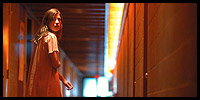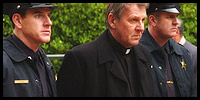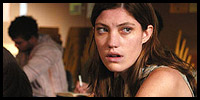
 |
|
The Exorcism of Emily Rose (2005) Cast: Laura Linney, Tom Wilkinson, Jennifer Carpenter, Campbell Scott, Colm Feore, Henry Czerny, Mary Beth Hurt, Shohreh Aghdashloo, JR Bourne, Joshua Close, Duncan Fraser, Marilyn Norry, Andrew Wheeler, Katie Keating 2005 – 118 minutes Rated: Reviewed by Dustin Putman, August 26, 2005.  "The Exorcism of Emily Rose," one part enthralling courtroom drama, one part scary-as-hell horror tale, and one part thought-provoking rumination on the relationship between one's belief and one's faith, is almost too good to be true. Superlatively written and directed by Scott Derrickson (whose previous scripting credit alongside Paul Harris Boardman, 2000's "Urban Legends: Final Cut," suggested about one-eightieth of their full abilities), here is a motion picture—and one distributed by a major studio, no less—that is chock-full of actual ideas to go along with its almost unbearably spine-tingling cathartic pleasures. It is the perfect marriage between intellect and fear, complementing each other without ever becoming intrusive, and also classy proof that not all of today's horror films have to be about nubile hotties getting slaughtered or watered-down, teen-aimed wastes of space. Indeed, "The Exorcism of Emily Rose" manages to squeak by with a PG-13 rating—an initial red flag for a story involving demonic possession—without ever seeming to compromise its vision or its emphatic subject matter.
"The Exorcism of Emily Rose," one part enthralling courtroom drama, one part scary-as-hell horror tale, and one part thought-provoking rumination on the relationship between one's belief and one's faith, is almost too good to be true. Superlatively written and directed by Scott Derrickson (whose previous scripting credit alongside Paul Harris Boardman, 2000's "Urban Legends: Final Cut," suggested about one-eightieth of their full abilities), here is a motion picture—and one distributed by a major studio, no less—that is chock-full of actual ideas to go along with its almost unbearably spine-tingling cathartic pleasures. It is the perfect marriage between intellect and fear, complementing each other without ever becoming intrusive, and also classy proof that not all of today's horror films have to be about nubile hotties getting slaughtered or watered-down, teen-aimed wastes of space. Indeed, "The Exorcism of Emily Rose" manages to squeak by with a PG-13 rating—an initial red flag for a story involving demonic possession—without ever seeming to compromise its vision or its emphatic subject matter.
 Director Scott Derrickson, aided by masterful editor Jeff Betancourt (2004's "The Grudge"), seamlessly interweaves the present with the past through expertly set-up flashbacks to tell the story of 19-year-old college student Emily Rose (Jennifer Carpenter), a studious, kindhearted young woman with a devout Catholic upbringing who was believed to be possessed by six separate demonic entities. As the film opens, she has met an untimely end, and the Rose family's parishioner, Father Moore (Tom Wilkinson), is about to be tried on charges of criminally negligent homicide following a church-blessed exorcism.
Director Scott Derrickson, aided by masterful editor Jeff Betancourt (2004's "The Grudge"), seamlessly interweaves the present with the past through expertly set-up flashbacks to tell the story of 19-year-old college student Emily Rose (Jennifer Carpenter), a studious, kindhearted young woman with a devout Catholic upbringing who was believed to be possessed by six separate demonic entities. As the film opens, she has met an untimely end, and the Rose family's parishioner, Father Moore (Tom Wilkinson), is about to be tried on charges of criminally negligent homicide following a church-blessed exorcism.
 Taking the case is underappreciated ace defense attorney Erin Bruner (Laura Linney), a non-religious workaholic who halfheartedly tells Father Moore during their first meeting that she is an agnostic with about the amount of gusto one takes in trying to decide on a drink order. At first skeptical of Father Moore's supernaturally based claims, Erin gradually finds herself opening up to the possibilities of otherworldly forces after a series of strange occurrences and chance happenings start happening around her. As the trial presses forward and the many witnesses take to the stand, most siding with the prosecution that the victim suffered from epilepsy and psychosis, Emily's unsettling story, portrayed in flashback, begins to take shape.
Taking the case is underappreciated ace defense attorney Erin Bruner (Laura Linney), a non-religious workaholic who halfheartedly tells Father Moore during their first meeting that she is an agnostic with about the amount of gusto one takes in trying to decide on a drink order. At first skeptical of Father Moore's supernaturally based claims, Erin gradually finds herself opening up to the possibilities of otherworldly forces after a series of strange occurrences and chance happenings start happening around her. As the trial presses forward and the many witnesses take to the stand, most siding with the prosecution that the victim suffered from epilepsy and psychosis, Emily's unsettling story, portrayed in flashback, begins to take shape.
 Based on the purported true story of Anneliese Michel, a normal college girl whose death followed what many believed to be a real-life case of satanic possession, "The Exorcism of Emily Rose" sticks closely to a believable reality that avoids straining plausibility. The film is never preachy, never promoting any religious agenda, and never one-sided; instead, director Scott Derrickson only asks for the viewer to consider what might be possible within our world as it pertains to outside forces many might be apt to immediately write off as rubbish. It makes an increasingly convincing case on just that, no more so than during Erin's powerhouse closing statement, as she surveys the difference between fact, reasonable doubt, and all of the possibilities there might be in between the two. This climactic speech holds all the more weight coming from Erin, a three-dimensional, sharply constructed character who starts defending Father Moore without really buying what he says, and finishes the trial from a completely different place and with a startling, but never less than credible, change in her own belief system.
Based on the purported true story of Anneliese Michel, a normal college girl whose death followed what many believed to be a real-life case of satanic possession, "The Exorcism of Emily Rose" sticks closely to a believable reality that avoids straining plausibility. The film is never preachy, never promoting any religious agenda, and never one-sided; instead, director Scott Derrickson only asks for the viewer to consider what might be possible within our world as it pertains to outside forces many might be apt to immediately write off as rubbish. It makes an increasingly convincing case on just that, no more so than during Erin's powerhouse closing statement, as she surveys the difference between fact, reasonable doubt, and all of the possibilities there might be in between the two. This climactic speech holds all the more weight coming from Erin, a three-dimensional, sharply constructed character who starts defending Father Moore without really buying what he says, and finishes the trial from a completely different place and with a startling, but never less than credible, change in her own belief system.
 Lest it seem like the movie is all talk and no action, the most astounding thing about "The Exorcism of Emily Rose" is just how well it juggles the courtroom dealings, Erin's personal journey toward a kind of enlightenment, and the flashback sequences, liberally sprinkled throughout, of Emily's traumatic experiences. Above all, the film is a masterpiece of psychological horror, building such a heavy feeling of palpable dread and outright terror that it evokes actual goose bumps. Parents taking their pre-teens to a showing of the picture, reassured by the safe PG-13 rating, should probably think again, or risk being up all night with a horrified child afraid to sleep alone. In fact, some adult viewers less prone to the level of intensity Derrickson elicits may experience a similar outcome.
Lest it seem like the movie is all talk and no action, the most astounding thing about "The Exorcism of Emily Rose" is just how well it juggles the courtroom dealings, Erin's personal journey toward a kind of enlightenment, and the flashback sequences, liberally sprinkled throughout, of Emily's traumatic experiences. Above all, the film is a masterpiece of psychological horror, building such a heavy feeling of palpable dread and outright terror that it evokes actual goose bumps. Parents taking their pre-teens to a showing of the picture, reassured by the safe PG-13 rating, should probably think again, or risk being up all night with a horrified child afraid to sleep alone. In fact, some adult viewers less prone to the level of intensity Derrickson elicits may experience a similar outcome.
 Emily's story is at once touching, inspiring, awful, and exceptionally disturbing, with a definite emphasis on the latter. One particular sequence in which she is stalked by hallucinations around her campus, each person she passes transforming into hideous demons, has to rank as one of the most profoundly scary put to film in a long time. The centerpiece exorcism of the title follows close behind in unadulterated jittery effectiveness, dodging the trappings of being just another clone of "The Exorcist" and coming up with a wholly fresh way to portray it. Also lending priceless support are the sumptuous, atmosphere-drenched autumnal cinematography by Tom Stern (2004's "Million Dollar Baby") and creepily riveting, imaginatively composed music score by Christopher Young (2001's "The Glass House").
Emily's story is at once touching, inspiring, awful, and exceptionally disturbing, with a definite emphasis on the latter. One particular sequence in which she is stalked by hallucinations around her campus, each person she passes transforming into hideous demons, has to rank as one of the most profoundly scary put to film in a long time. The centerpiece exorcism of the title follows close behind in unadulterated jittery effectiveness, dodging the trappings of being just another clone of "The Exorcist" and coming up with a wholly fresh way to portray it. Also lending priceless support are the sumptuous, atmosphere-drenched autumnal cinematography by Tom Stern (2004's "Million Dollar Baby") and creepily riveting, imaginatively composed music score by Christopher Young (2001's "The Glass House").
 Performances are sterling across the board, some even Oscar-worthy, but the film belongs to the three central players. As Attorney Erin Bruner, Laura Linney (2002's "The Mothman Prophecies") leads the way with a layered, quietly poignant turn that doesn't step wrong once. It is, in fact, her powerful character arc that the viewer follows most closely, and the role blesses Linney with a bevy of richly diverse emotions to play with. As Father Moore, who faces an uphill battle at being taken seriously but refuses to falter from his faith, Tom Wilkinson (2001's "In the Bedroom") brings outstanding command and dignity to his scenes. Finally, Jennifer Carpenter, whose unlikely biggest previous credit was 2004's "White Chicks," delivers one of 2005's most surprising and harrowing standout examples of acting virtuosity. The role of Emily Rose had to be physically demanding and emotionally draining to say the least, and Carpenter is up to every challenge placed in front of her, appearing sympathetic one minute and evil incarnate the next.
Performances are sterling across the board, some even Oscar-worthy, but the film belongs to the three central players. As Attorney Erin Bruner, Laura Linney (2002's "The Mothman Prophecies") leads the way with a layered, quietly poignant turn that doesn't step wrong once. It is, in fact, her powerful character arc that the viewer follows most closely, and the role blesses Linney with a bevy of richly diverse emotions to play with. As Father Moore, who faces an uphill battle at being taken seriously but refuses to falter from his faith, Tom Wilkinson (2001's "In the Bedroom") brings outstanding command and dignity to his scenes. Finally, Jennifer Carpenter, whose unlikely biggest previous credit was 2004's "White Chicks," delivers one of 2005's most surprising and harrowing standout examples of acting virtuosity. The role of Emily Rose had to be physically demanding and emotionally draining to say the least, and Carpenter is up to every challenge placed in front of her, appearing sympathetic one minute and evil incarnate the next.
 After a summer season filled to bursting with sequels, remakes, and empty action extravaganzas, "The Exorcism of Emily Rose" couldn't have come at a better, and more welcome, time. Thoughtful, non-exploitive, engrossing, petrifying, and visually stunning from start to finish (such adjectives are not hyperbole), the film recalls a time when the Hollywood moviemaking system was willing to take chances and make works of cinematic art with more on the brain than just frivolous, throwaway flatulence jokes, explosions, and threadbare jump scares. "The Exorcism of Emily Rose" has more on the brain than that, and pays off with a rare complexity that services the frightening moments to stunning effect. The bravura final shot, subtle and beautifully simple, is the bold last piece of a puzzle that makes all that has come before complete, suggesting that in order to move on in our day-to-day lives, we must be willing to consider, accept and embrace those things that we have no control over. "The Exorcism of Emily Rose" is one of the very best films of the year.
After a summer season filled to bursting with sequels, remakes, and empty action extravaganzas, "The Exorcism of Emily Rose" couldn't have come at a better, and more welcome, time. Thoughtful, non-exploitive, engrossing, petrifying, and visually stunning from start to finish (such adjectives are not hyperbole), the film recalls a time when the Hollywood moviemaking system was willing to take chances and make works of cinematic art with more on the brain than just frivolous, throwaway flatulence jokes, explosions, and threadbare jump scares. "The Exorcism of Emily Rose" has more on the brain than that, and pays off with a rare complexity that services the frightening moments to stunning effect. The bravura final shot, subtle and beautifully simple, is the bold last piece of a puzzle that makes all that has come before complete, suggesting that in order to move on in our day-to-day lives, we must be willing to consider, accept and embrace those things that we have no control over. "The Exorcism of Emily Rose" is one of the very best films of the year.
|
© 2008 by Dustin Putman |














